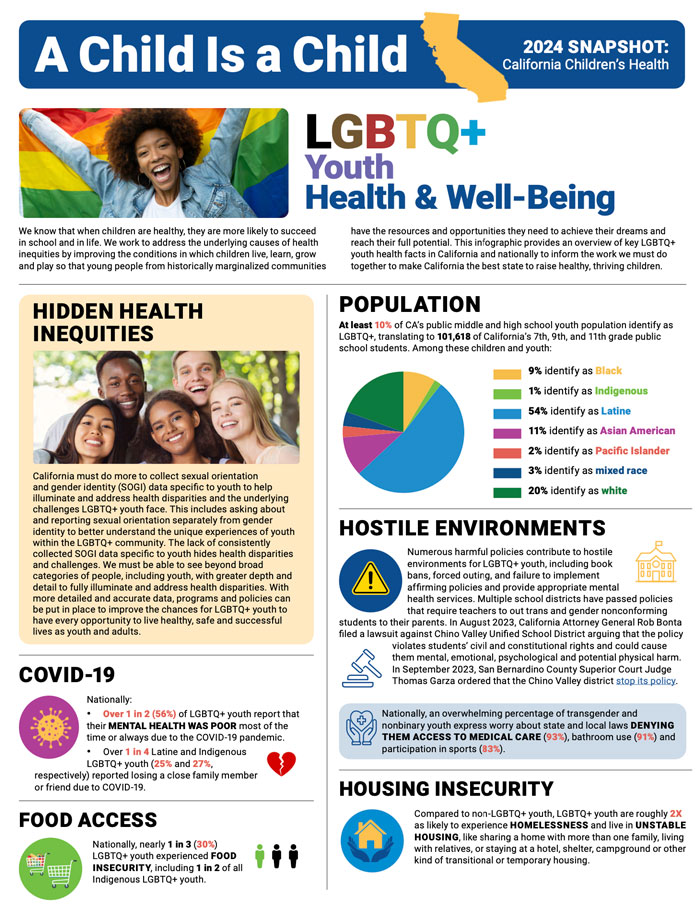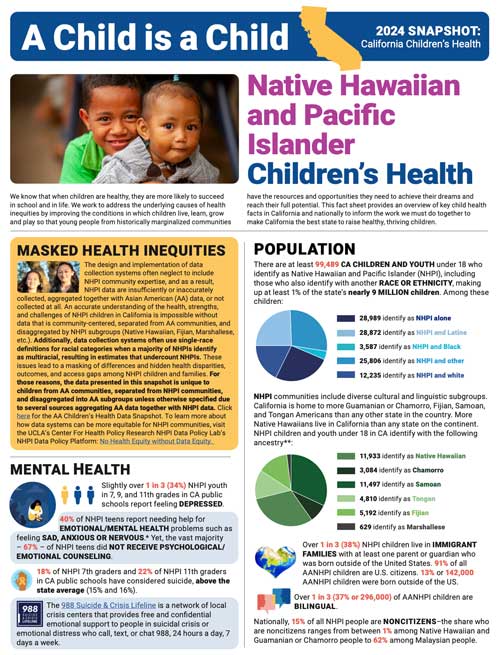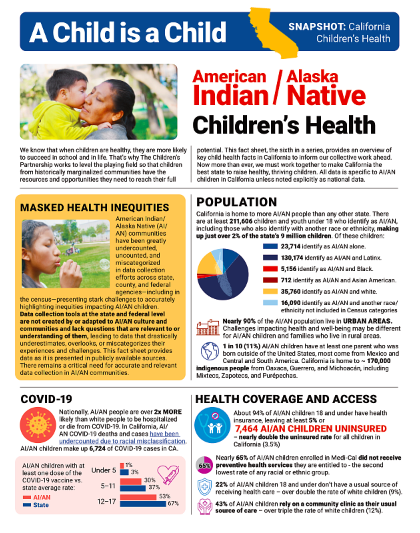As our nation and state’s child population continues to grow increasingly diverse, we must activate efforts and implement strategies that address the immediate and long term health and wellbeing of all children, regardless of background. Specifically, we must acknowledge the health inequities that continue to persist in the lives of marginalized children in California and in the rest of the nation.
To provide a snapshot of the health needs of our children, The Children’s Partnership developed a series of fact sheets as part of its “A Child is a Child” campaign. This campaign unites a strong and diverse coalition of individuals and organizations to fight for the right of every child. Across issue areas, our shared resources, experiences and perspectives will help ensure a healthy and bright future for all children.
The fact sheet series will discuss factors that contribute to disparate health outcomes, such as food insecurity, poverty-stricken households, childhood trauma, along with many other systemic inequities that persist in the lives of marginalized children.
This research lays the foundation for a collective equity agenda to transform current programs and policies that ensure all children, no matter their background, have the resources and opportunities they need to reach their full potential and lead healthy lives.
Children in Immigrant Families Health Fact Sheet: June 2024
We celebrate the 4,013,000 children who are part of immigrant families in California, making up nearly half of our state’s 9 million children. We proudly partnered with the Children Thrive Action Network (CTAN) and the California Protecting Immigrant Families (CA-PIF) campaign to release an updated fact sheet in our A Child is a Child series spotlighting the health of children in immigrant families in our state.
Children in immigrant families in California are a racially and ethnically diverse population who bring a wealth of cultural and linguistic assets to our state. While we acknowledge that health inequities that exist within the immigrant community are overlooked, the data presented in this fact sheet highlights some of the unique issues that children in immigrant families face in California that shape their health and well-being, including mental health, health coverage and access, economic well-being and more. The fact sheet also highlights protective factors – conditions or attributes that help mitigate or eliminate risks to health – that can support the lifelong success of children in immigrant families, including multilingualism, family cohesion and connection to heritage/culture.
Lesbian, Gay, Bisexual, Transgender, Queer+ (LGBTQ+) Youth Health Fact Sheet: June 2024
We honor the health of over 20,000 LGBTQ+ children and teens that live in our state, 75 percent of whom also identify as Latine, Indigenous, Black, Asian American, Native Hawaiian, Pacific Islander or mixed race. The fact sheet includes data that highlights COVID-19, racism, child welfare, food and housing insecurity, child welfare and juvenile justice. Our state must focus on this population and address the health inequities they face and their underlying causes. It is our hope that advocates, policy-makers, parents, guardians, teachers and others use this fact sheet to better understand where systemic inequities exist in order to be stronger allies to the LGBTQ+ youth that live in our state.
We also acknowledge that we must continue to urge California to do more to collect data specific to LGBTQ+ children, youth and young adults to more fully understand the structural disadvantages and inequities that impact the health of LGBTQ+ youth. With accurate data, programs and policies can be put in place to improve the chances for LGBTQ+ youth to have every opportunity to live healthy, safe and successful lives as youth and as adults.
Asian American (AA) & Native Hawaiian and Pacific Islander (NHPI) Children’s Health Fact Sheets: May 2024
In celebration of Asian American, Native Hawaiian and Pacific Islander Heritage Month, we are proud to partner with Asian Resources, Inc. and Native Hawaiian and Pacific Islander Data Policy Lab at UCLA Center for Health Policy Research to release two data snapshots in our A Child is a Child series spotlighting Asian American (AA) and Native Hawaiian and Pacific Islander (NHPI) children in California.
Health inequities that exist between and within the AA and NHPI communities are overlooked at least in part because much of the data on these racially and ethnically diverse populations are aggregated, leading to a masking of differences and hidden health disparities between racial and ethnic subgroups. We separated the Asian American and Native Hawaiian and Pacific Islander fact sheets into two separate fact sheets. Where possible, we used disaggregated data focused on each community separately.
The data presented in these fact sheets highlight strengths and assets, as well as some of the barriers that AA and NHPI children and youth and families face in California that shape their health and well-being on issues including COVID-19, mental health, health coverage, language access, hate and discrimination, economic well-being and more.
Black Children’s Health Fact Sheet: February 2024
We honor and celebrate Black History Month 2024 by highlighting the health of the 700,000+ Black children and youth who currently live in our state.
We partnered with the California Black Health Network and California Black Women’s Health Project on a fact sheet that highlights how systemic racism shapes the lives of Black children, ultimately impacting their success and healthy development. It provides data that highlight inequities across health, mental health, housing, economic security, oral health, food access, school and safety and more; and community-defined protective factors that help address and mitigate these inequities that have only been exacerbated by COVID-19. This Black History Month we celebrate Black children and teens and acknowledge that we must do more to support their health and well-being.
Latine Children’s Health Fact Sheet: November 2023
We are proud to honor Latine Heritage Month this November 2023 in partnership with the Latino Coalition for a Healthy California, Latino Health Access, and Abriendo Puertas by highlighting the 4,616,456 or over half (52%) of California’s 9 million children who are Latine.
The 2023 A Child is a Child: Latine Children’s Health Snapshot can help advocates, policymakers, parents, guardians, teachers and others to better understand who California’s Latine children are and where systemic inequities exist.
Latine children and youth make up a large and diverse population in California. They and their families are resilient with a wealth of cultural and linguistic assets – half of our state’s Latine children are fully bilingual. Yet despite these strengths, they also face inequities in health care, food, housing and digital access:
-
210,706 Latine children are uninsured.
-
20% (43,400) of Latine mothers experience food insecurity during pregnancy, compared to 10% of white mothers.
-
74% of students experiencing homelessness are Latine (135,665).
-
30% of Latine households with children (630,000) AVOIDED GOVERNMENT BENEFITS due to concerns over self or family member’s disqualification from receiving a green card.
American Indian and Alaska Native Children’s Health Fact Sheet: November 2022
We honor and celebrate American Indian Heritage Month 2022 by highlighting the health of the 200,000 American Indian and Alaska Native children and youth who currently live in our state. Over 300,000 early indigenous peoples lived across lands in what is now known as California before colonization. These diverse communities spoke approximately 100 distinct languages, and included, among other tribes: the Chumash, Serrano, Tongva, Cahuilla, Yoruk, Maidu, Mojave, Pomo, Miwok and Modoc. Despite the atrocities of colonization and genocide, American Indian communities are resilient and persist in California today. California is home to more Native American people than any other state in the country. Currently, there are close to 200 tribes in California, 110 of which are recognized by the U.S. federal government. Children who identify as American Indian in California come from communities of the original people of North, Central and South America. California is home to an estimated 170,000 indigenous people from the Mexican states of Oaxaca, Guerrero, and Michoacán, including Mixtecs, Zapotecs, and Purépechas.
This month, with the sixth and final fact sheet in our #AChildIsAChild series for 2022, we partnered with the California Consortium for Urban Indian Health (CCUIH), Two Feathers Native American Family Services and United American Indian Involvement (UAII) to center data that focuses on providing a snapshot of Native American children and youth in California and some of the challenges they face impacting their success and healthy development. Inequities in health are rooted in historical oppression and trauma and systemic racism that continues to impact the well-being of American Indian and Alaska Native children in our state. The data presented in the fact sheet will inform our collective advocacy to advance child health equity for all children.
Citations
The Children’s Partnership collected Asian American, Native Hawaiian and Pacific Islander children and youth data from the U.S. Census Bureau’s 2020 American Community Survey’s 5-year estimates (where available), the 2019 American Community Survey 1-Year Estimates, the 2020 CA Health Interview Survey, the 2019-20 National Survey of Children’s Health, the CA Department of Education, the CA Department of Public Health and a few other discrete sources. All data is from California unless otherwise noted. Click to download full citations: [2024 – AA] [2024 – NHPI]
The Children’s Partnership collected the most recent publicly available data on Black children and youth from the U.S. Census Bureau’s American Community Survey 1-Year Estimates and 5-Year Estimates, the California Health Interview Survey, the National Survey of Children’s Health, the California Healthy Kids Survey, the California Department of Education, the California Department of Public Health, the California Department of Health Care Services, the Centers for Disease Control and Prevention, and a few other discrete sources. Click to download full citations: [2024]
The Children’s Partnership collected LGBTQ+ children’s data from various sources. Original data and sources are available here.
The Children’s Partnership collected data on children in immigrant families from the Urban Institute’s Children of Immigrants Data tool, the U.S. Census Bureau’s 2019-2020 American Community Survey, the 2020 California Health Interview Survey, the 2019-2020 National Survey of Children’s Health, the CA Department of Education, the CA Department of Public Health and a few other discrete sources. Full citations can be found here.
For the 2022 version, The Children’s Partnership collected Latine children’s data from the U.S. Census Bureau’s 2021 American Community Survey 1-Year Estimates and 2016-2020 5-year estimates; the 2020 CA Health Interview Survey, the 2019-2020 National Survey of Children’s Health, 2019 CDC’s Youth Risk Behavior survey, and a few other discrete sources. All data is specific to Latinx children in California unless noted explicitly as national data. Citations can be found here.
The Children’s Partnership collected data on AI/AN children from the U.S. Census Bureau’s 2016-2020 American Community Survey 5-Year Estimates and 2021 1-year estimates; pooled data from the 2019, 2020, 2021 CA Health Interview Survey; the 2017-2019 California Healthy Kids Survey; the California Department of Education and a few other discrete sources. All data is from California unless noted explicitly as national data. Click to download full citations: [2022]







